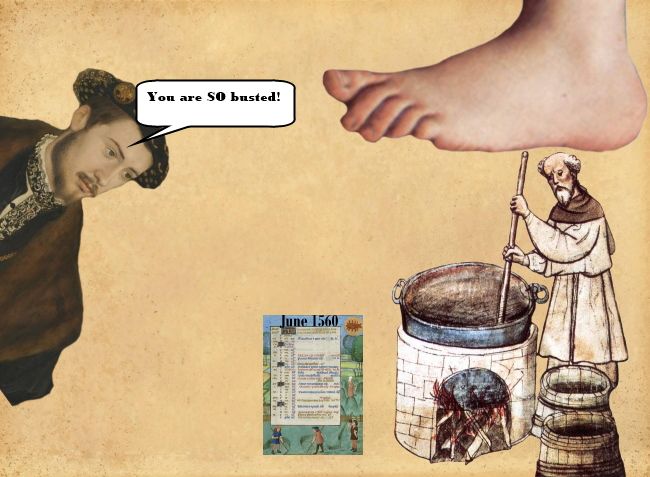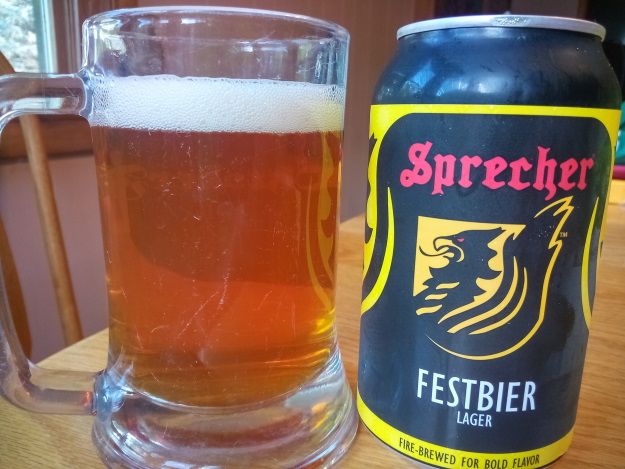Back in the summer Sprecher Brewery released Festbier, a…um…festbier, I guess. To the best of my knowledge, this is the first time Milwaukee’s oldest microbrewery has brewed this type of beer. So what exactly is a festbier?
Bueller? Bueller?
“Oktoberfestbier” seems to be a trademarked appellation, not unlike Kölsch, Champagne, and Bubbler, for the brews made by the 6 Munich breweries that have the right to serve their beers at the festival. Or are Oktoberfestbiers the only beers allowed to be served in a certain part of the festival grounds? It’s not clear to me. Festbier, on the other hand, appears to have a more nebulous meaning.
Here’s what I have been able to piece together after years¹ of research:
If you take a little trip back to Bavaria in the mid-16th century, you will find that the brewers there decreed that one could brew only between 29 September and 23 April. Or it was Duke Albrecht V that issued this edict? Why would whoever it was do such a thing? Well, the main reason cited by all the sources I found was because brewing beer involved boiling and boiling means fire and fire means Danger, Will Robinson! - as in your whole town with its fine wooden buildings could burn down.
While I can understand the summer months being of particular concern for fire hazards, the German love of beer runs deep. The Roman historian Tacitus noted this proclivity back in the first century C.E. so those Bavarian public awareness campaigns must have been hardcore and/or ubiquitous. I am picturing Smokey Bär dressed in Lederhosen – “Nur Sie can prevent the whole town from burning down!”
Presumably this fire hazard existed long before this brewing decree so why did they wait so long? The mills of Bavarian bureaucracy ground slowly but exceedingly fine, apparently.
The new brewing restrictions gave way to a new beer. If you brewed a whole lot of bier in, say, Märzen (March) and let it age the requisite 8 weeks or so, you will have liquid refreshment available just as the season of no brewing kicks in and the biergartens open. And if you made it a bit stronger, the stuff could last until the autumn where it would be quaffed by revelers at autumnal festivals. Hopefully you’d have enough to last until fresh batches could be made. I bet every brewery started brewing at exactly midnight on 29 September with whole towns aglow from the boilers firing up.
These Märzen beers became the standard at Oktoberfest at some point because, well, they were available...? I guess they started out with very dark due to the kilning technology of the age but eventually became the amber and the new standard. In 1953, Augustiner, one of the 6 official Oktoberfest breweries, introduced a pale Oktoberfestbier which has gone on to replace the amber colored one. According to Ron Pattinson, it’s the beer’s strength that makes a Märzen a Märzen. So today you’d be served a Helles Märzen at Oktoberfest whereas prior to 195X you’d have gotten a Bernstein (amber) Märzen.
I haven’t found anything explaining why Augustiner decided to go with a Helles Märzen after decades of the Bernstein stuff. Was it cheaper to make? Maybe they just wanted to shake things up after 100 years.
It seems that here in the United States, we think of the Märzen/Oktoberfest as being a strong amber lager and a style unto itself with the festbier being Märzen-like with a strong malt flavor but more of a golden color and in its own stylistic category.
Festbier – Sprecher’s brew, that is – was a welcome surprise. After I learned of the brewery’s sale back in early 2020, I was filled with trepidation. One article had some quotes that sounded like they came from a venture capital Krampus ready to beat the poor brewmaster until every mash tun and brite tank was filled with IPA. It was all money man talk of growing the brand with the goal of making a lot more product within a few years or some such thing. Then Refresh Button IPA came out and it seemed like my worst fears were coming true. "Soon there’ll be exploding cans of fruited sours and ad copy that used the word 'crushable'," I lamented.
Thusly seeing Festbier in the cooler was a delightful surprise. Sadly, it seems that Festbier has replaced the excellent Summer Pils as their summer seasonal. You can’t have everything.
Festbier is a lovely deep gold color and clear as day. My pour had a smallish disc of loose, white foam on top. A larger head would have been nice but the paucity of foam was probably due to bad pouring skillz on my part. On the plus side, the foam lasted quite a while. I spied a goodly number of bubbles inside. The aroma was largely honey-like and sweet but the hops were present too adding a little grass here and something floral there.
For a summer brew, it was heavier than I expected. Not the liquid bread of a doppelbock but medium-heavy. While there were definitely honey and caramel flavors here, the beer wasn't overly sweet. A faint roastiness stayed in the background along with some spicy, Saaz hoppiness. Perhaps those hops were meant for a summer pils and just had to be used up when plans were changed. The fizz was firm and gave a noticeable astringent bite.
All of that malty sweetness slowly faded for the finish allowing the spicy hop flavors to come to the fore. They offered a solid dose of bitterness and sturdy dryness.
My experience with Helles Märzen is limited to Paulaner's Oktoberfest Wiesn which is now called Oktoberfest Bier, at least here in the States. Think of it as a bigger Helles - in malt, hops, and alcohol. Sprecher's Festbier is 5.3% A.B.V. so it's between a Helles and Helles Märzen on that front. I think. It also tastes less bready than Paulaner's brew. Still, Sprecher has made a very tasty beer here. A bit too heavy on the mouthfeel for my summer drinking taste when it's 90 degrees out, but it has the virtue of not being too sweet. And the malty flavors are well complemented by those spicy Saaz hops. A fine late summer treat.
Junk food pairing: Sprecher's Festbier pairs well with pretzels and I found gustatory nirvana by snacking on some Snyder's Snyderfest Beer Cheese Pretzel Pieces.
¹ i.e. - minutes


No comments:
Post a Comment